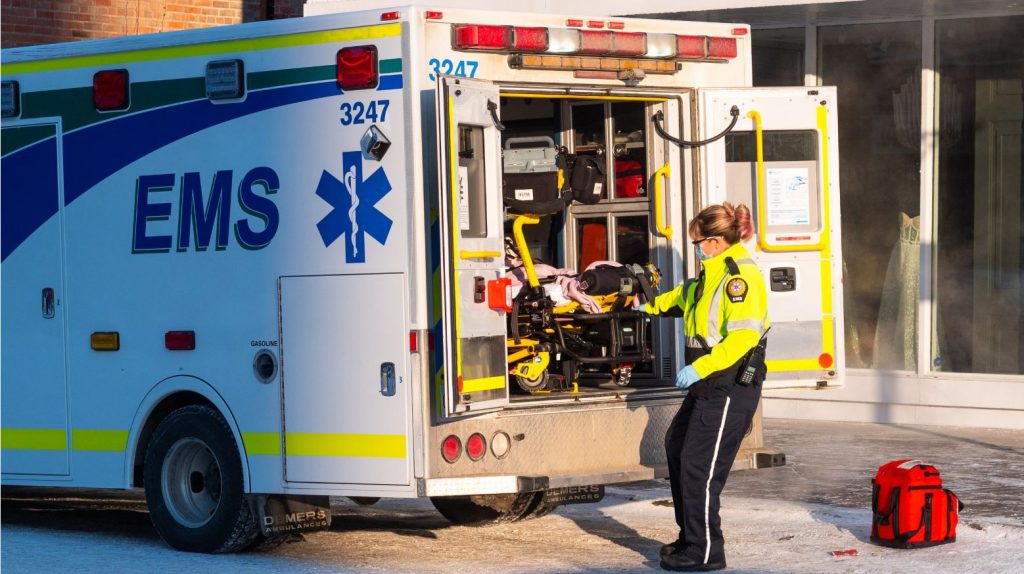Calgary EMS took 30 minutes to respond to dog attack victim: AHS

Posted Jun 7, 2022 11:58 am.
Last Updated Jun 7, 2022 2:21 pm.
In an instance highlighting the province’s ongoing problem with ambulance wait times, Alberta Health Services (AHS) says it took 30 minutes for paramedics to respond to Sunday’s deadly dog attack that left a woman in her 80s dead.
AHS says the half-hour delay for an ambulance is longer than it expects and “outside the target response times.”
It usually takes about 10 minutes to drive from the community of Capitol Hill — where the dog attack took place — to Foothills Medical Centre.
“This is a tragic event, and our deepest condolences are with the family and friends of this individual,” a spokesperson for AHS said. “We have started an immediate review of the EMS response. Our team is reaching out to the family to share our condolences and to discuss the response directly.”
AHS adds that Calgary EMS was under pressure with a high volume of calls at the time the woman was attacked by the dogs in an alleyway, and there were no ambulances readily available .
“We are grateful to the paramedics who treated the patient at the scene, as well as first responder partners at the Calgary Fire Department, and the Calgary Police Department,” the AHS spokesperson said.
Ambulance wait times have been a growing problem in Alberta for months, and paramedics have been warning that the system is under pressure.
The province has put the blame on the COVID-19 pandemic, the opioid crisis, and staffing challenges.
It’s also become more commonplace to hear accounts of people needing an ambulance being taken to hospital by other first responder vehicles.
In January, four emergency calls came in simultaneously in Airdrie, on Calgary’s northern outskirts, forcing one medically fragile boy with a broken leg to be taken to hospital by fire truck because ambulances weren’t available.
READ MORE:
-
Alberta to alleviate pressure as paramedics say they’re overwhelmed and understaffed
-
Alberta hospitals face numerous factors creating lengthy wait times
-
Calgary getting new operations centre to address long ambulance wait times
The shortage in Calgary and Edmonton prompted Health Minister Jason Copping to recently announce more ambulances would be added to those cities.
At the time of the announcement, Mike Parker, president of the Health Sciences Association of Alberta, said it wasn’t good enough to alleviate the pressures being faced.
Parker stressed that the issue Alberta is facing is not with the number of ambulances, but with the amount of staff required to run them.
“There is no lineup of paramedics that are coming in the door to work here right now,” Parker said. “I think AHS is the problem, it’s a toxic employer. We’ve got people exiting non-stop.”
In an interview with CityNews Tuesday, Parker called the elderly woman’s death a tragic loss for the community. He says while EMS does everything it can to get to calls as soon as possible, delayed ambulance response times unfortunately happen every day in the province.
“This is the canary in the coal mine for our health care system,” Parker said. “I will never stop advocating and raising the alarm on this issue, and this hasn’t been a week, or a month, or a year — this has been 10 years. The hardest part of it is it’s the entire health care system that looks like this, and only in a back alley in north Calgary do we see what it truly means to a person who is in desperate need for help.”
Parker adds EMS would have made a difference if they could have gotten there sooner. However, he admits the pressure on paramedics is intense.
“When we look at how the system has been managed over the last 10 years, there has been a population increase and a zero additional resource level to the paramedics on the front lines,” Parker said.
“Just last week we had 400 vacant shifts within this province. You want to know why the trucks are not getting to their calls? We don’t have the people.”
Parker says incidents like this dog attack leave a devastating impact on paramedics.
“To show up and the best they can offer is condolences, when did that become a reality for a paramedic?” Parker asked. “That’s why we’re seeing a mass exodus of our members from this profession — they don’t want to do it anymore when that’s the best they can offer.”
Meanwhile, NDP Health Critic David Shepherd made a statement Tuesday, pointing the finger at the health minister.
“This situation has become dangerously common and response times in Calgary in 2022 are the slowest on record,” Shepherd said.
“Paramedics have been raising the alarm for months. Alberta’s ambulance and hospital system have been pushed to the breaking point by the incompetence of Minister Jason Copping and the UCP. This intolerable delay in responding to a critically wounded Albertan is the result. Copping must face Albertans today and accept responsibility for his catastrophic mismanagement of the healthcare system.”
–With files from Saif Kaisar, Carly Robinson and The Canadian Press








